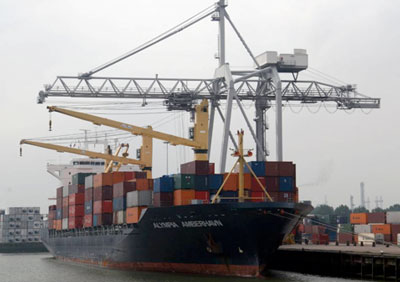 | Container logistics Math Alympiad. Final 2008-2009 |
The activity
 | Container logistics Many goods are transported in containers, and a part of that transport takes place by ship. When a container ship arrives in port the job of unloading and loading begins, and of course that needs to be done as fast as possible. The handling as a whole (unloading, storage, loading) is called transshipment of containers. This transshipment must be done as efficiently as possible both in time and cost. This assignment is about making the transshipment of containers as efficient as possible.Dutch version |
Background information
|
Math A-lympiad The Mathematics A-lympiad is a real-world-mathematics-problem-solving competition for teams of students forom uppe secondary schooles, with open ended assignments. The open assignments are designed by the A-lympiad committee, a committee residing at the Freudenthal Institute of Utrecht University in the Netherlands, that organizes the Mathematics A-lympiad since 1989. The aim is to elicit students to think mathematically, to solve open-ended unfamiliar problems in a creative way, to model, structure and represent problems and solutions, to work collaboratively and to communicate about mathematics. The task is set in a non-mathematical real life (often work related) situation that asks for mathematical modelling and problem solving. The final product is a report fitting the real-life context of the task. Math in teams During the Dutch Mathematics Day Contest students work in teams of about 3 to 4 members on an open mathematical problem solving task during a couple of hours. The product of this work is a report (and sometimes a presentation). |
Using your skills in a new setting
|
| Freudenthal Institute: Home - Utrecht University | Freudenthal Collection: Home - Showcase - Archive | Subset: Math A-lympiad |